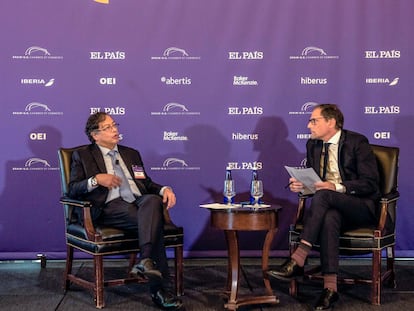Spain’s PM: ‘We are entering a critical phase, Putin already knows he’s losing the war’
Pedro Sánchez thinks his country is better prepared that others in Europe to survive an energy crisis thanks to early investment in renewables and a recent reduction in electricity consumption
Russian leader Vladimir Putin’s threat to deploy nuclear weapons in the Ukraine war has shaken the United Nations General Assembly, which is meeting this week in New York. Ahead of his scheduled address at the UN, Spain’s Prime Minister Pedro Sánchez on Wednesday responded to Putin’s speech at a forum organized by EL PAÍS and the Spain-US Chamber of Commerce at the Yale Club in Manhattan, where the Spanish leader also explained why he thinks his country is better positioned than others to deal with an energy supply cut.
“This morning, Putin has made completely unacceptable statements. We are always going to be on the side of the party under attack, which is Ukraine,” he told a group of political, economic and educational leaders from both sides of the Atlantic gathered at the exclusive venue, where speakers included Colombian president Gustavo Petro.
Sánchez said that Putin’s threats and his push for referendums in pro-Russia separatist areas of eastern Ukraine are signs of weakness.
“These [statements and actions] show that we are entering a much more critical phase of the war, which is when the aggressor realizes that he is losing the fight. I believe that the possibility of a total [energy] supply cut is real, due to the will of an autocrat to turn energy into a weapon of war. This is the time when the support of Europe and all democracies for Ukraine is most needed.”
Sánchez, who heads a center-left government, added that the most worrying consequence, in addition to the energy crisis in Europe, is the possibility of a food crisis in the poorest countries. But he said Spain is well equipped to deal with the fallout.
“Spain is in a better position than other European economies to withstand this crisis. I am cautiously optimistic. Above all, this is because of the sustained commitment we made in 2018 [the year Sánchez took office] to renewable energy, which makes Spain one of the countries least dependent on Putin’s energy blackmail. In addition, Spain has already reduced electricity consumption by 4% without affecting the economy.”
The Spanish leader, who is also due to meet with several investment funds with major holdings in Spain, underscored the growth of his country’s economy.
“The Spanish economy grew above the EU average this year. The consensus is that we will exceed 4% growth in 2022 and 2% in 2023. We have 330,000 more people in employment than last year. We have the lowest unemployment rate since 2008. Temporary jobs are below 20%, breaking a dynamic of historical precariousness. In the tourism sector, we are practically at pre-pandemic levels. Exports have grown by 20%.We have much stronger foundations than in the past… households and businesses are much less indebted. Our country is much more resilient.”
Tu suscripción se está usando en otro dispositivo
¿Quieres añadir otro usuario a tu suscripción?
Si continúas leyendo en este dispositivo, no se podrá leer en el otro.
FlechaTu suscripción se está usando en otro dispositivo y solo puedes acceder a EL PAÍS desde un dispositivo a la vez.
Si quieres compartir tu cuenta, cambia tu suscripción a la modalidad Premium, así podrás añadir otro usuario. Cada uno accederá con su propia cuenta de email, lo que os permitirá personalizar vuestra experiencia en EL PAÍS.
¿Tienes una suscripción de empresa? Accede aquí para contratar más cuentas.
En el caso de no saber quién está usando tu cuenta, te recomendamos cambiar tu contraseña aquí.
Si decides continuar compartiendo tu cuenta, este mensaje se mostrará en tu dispositivo y en el de la otra persona que está usando tu cuenta de forma indefinida, afectando a tu experiencia de lectura. Puedes consultar aquí los términos y condiciones de la suscripción digital.
More information
Archived In
Últimas noticias
Most viewed
- Sinaloa Cartel war is taking its toll on Los Chapitos
- Oona Chaplin: ‘I told James Cameron that I was living in a treehouse and starting a permaculture project with a friend’
- Reinhard Genzel, Nobel laureate in physics: ‘One-minute videos will never give you the truth’
- Why the price of coffee has skyrocketed: from Brazilian plantations to specialty coffee houses
- Silver prices are going crazy: This is what’s fueling the rally












































